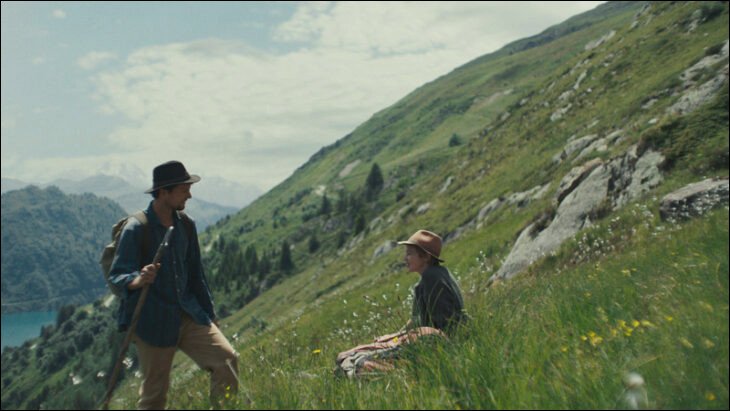Director: Sophie Deraspe
Writers: Sophie Deraspe, Mathyas Lefebure
Stars: Félix-Antoine Duval, Solène Rigot, Younes Boucif
Synopsis: In an unexpected twist of fate, a young advertising executive from Montreal abandons his high-paced life to embrace the rugged existence of a Provençal shepherd, intertwining his world with a free-spirited civil servant who has daringly left her job.
A decade has rolled by since the haunting echoes of The Wolves (or Les Loups), and now, Sophie Deraspe returns with a cinematic offering that can nearly be viewed as a companion piece to her Nature Reclaims its Rights duology—a testament to her evolving narrative style. Enter Shepherds (Bergers), a film alive with intricacies and resonant themes. The mere juxtaposition of the titles hints at a primal dance—wolves and sheep, predators and prey, locked in an eternal ballet of survival amidst the landscapes of the French Alps.
But it’s more than just animal instinct; it’s a profound exploration of humanity’s estrangement from the very essence of life itself. Our protagonist, Mathyas (masterfully embodied by Félix-Antoine Duval), literally turns his back on modernity. In a decision so spontaneous it seems almost reckless, he ditches his corporate existence to don the rustic mantle of a shepherd. What provokes this radical transition? The film leaves that question dangling in the air, like a distant echo—unimportant, overshadowed by the rich tapestry of his transformation. We first encounter him mid-sentence in his own story, resolutely cutting ties with his Canadian life, seeking meaning in the age-old rite of shepherding, and perhaps a fuller experience of being.
This notion isn’t merely my own interpretation; it reverberates through Deraspe’s insights shared during a post-screening talk at the Cinemania Festival. In the wide, starry-eyed gaze of Mathyas, we witness not just an actor, but a conduit of innocence. His initial encounters with seasoned shepherds reveal the daunting reality that greets fresh aspirations; their laughter rings hollow, questioning the very sanity of his choice. Who would willingly embrace such grueling labor? Yet, amidst the challenges posed by fierce elements and growing predatory instincts, there lies a glimmer of potential for transformation—not just for Mathyas, but for nature itself.
But the path to shepherding is fraught with hurdles, as Mathyas soon discovers. The intricacies of herding reveal the precarious balance between livelihoods and nature’s whims—a dangerous game where one misstep can spell disaster, not just for the shepherd but for the flock. His journey becomes intertwined with that of Élise (the captivating Solène Rigot), a civil worker intrigued by his newfound resolve, navigating the complexities of existence together, against a backdrop of climatic and personal turbulence.
In Shepherds, Deraspe paints a stark reality where humanity often wields a destructive force against nature. The initial passages of the film illustrate a battle between man’s ambitions and the unyielding laws of the wild. Scenes unfold as unsettling depictions of neglect, brutality, and exploitation characterize the interactions between shepherds and their flocks. A sick lamb plunges into chaos, forcing its owner into a frenzy that culminates in an act of incomprehensible violence. It’s here that the lens of cinematographer Vincent Gonneville shines in its ruthless beauty—he never explicitly showcases the gore, but rather, invites us to feel its implications through Mathyas’ anguished expressions.
This narrative strikes at philosophical chords as well, echoing Emmanuel Kant’s musings on intrinsic human wickedness. In The Wolves, the protagonist’s journey distorts the very fabric of her being, leading to an unraveling that intertwines self-interest with tragedy. Conversely, Shepherds finds Mathyas on a path of clarity amidst the madness encircling him. It’s not his spirit that taints, but rather those ensnared by greed around him—his former boss spiraling into madness, and a mentor lost to moral decay after committing an unthinkable act against an innocent lamb.
As storm clouds gather both literally and metaphorically, Mathyas’ awakening reaches a crescendo. The fury of nature unleashes a tempest, and within this chaos, the true essence of the film reveals itself—a struggle for authenticity against an unrelenting world. An awe-inspiring sequence emerges; Gonneville’s handheld camera immerses us in nature’s wrath, with sound design amplifying the palpable tension rippling through the air.
Though, the film’s journey veers into introspective space devoid of long-winded dialogues that once hindered Deraspe’s previous outings. The voiceover narration occasionally drags down what could have been even more profound moments of visual storytelling. Imagine if Shepherds had stripped away the superfluous cushions of narrative, creating a more immersive plunge into the visceral experience of reclaiming connection with the land.
In this ambitious undertaking, Shepherds goes beyond plot gimmicks or sensationalism. It bears witness to Mathyas’ exploration of self in nature’s embrace—an existence that contrasts heavily with his soulless corporate life. The conclusion of the film crystallizes its core message: nature’s dominion is unyielding, an immutable force that little can withstand.
Thus, Shepherds carves out its place within the rich annals of Québec cinema, reverberating alongside the works of Sébastien Pilote, Guy Édoin, and others who have thoughtfully delved into similar themes. Mathyas, through his trials, comes to realize he cannot dictate nature’s course—yet, in surrender, he finds a deeper sense of self, one that eluded him in the sterile heights of advertising. How poignant that in channeling the reflections of a simpler life, he discovers the essence of existence itself.
Grade: A-

